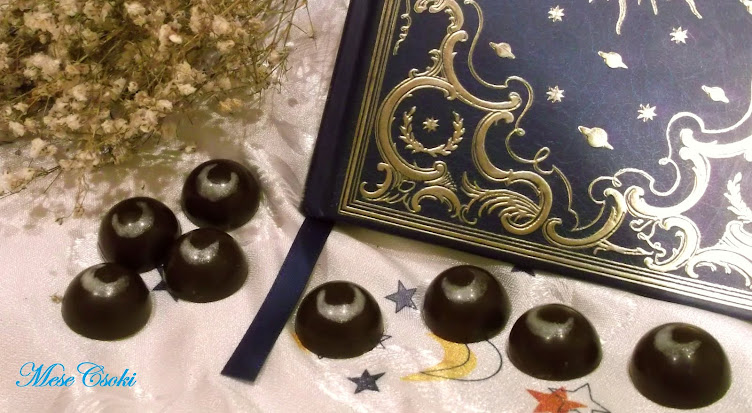Ma van a költészet napja. Mások a FB-on postolgatják kedvenc verseiket, én viszont itt fogom ezt megtenni. Több is van belőlük, persze. Kedvenc költőim közé tartozik a tragikus sorsú Radnóti, Kosztolányi és Tóth Árpád. De most egy olyan verset fogok idemásolni, amibe első olvasásra beleszerettem, és azóta is tudom kívülről. Ritka az olyan vers, aminek ennyire magával ragadó, sejtelmes a hangulata, aminek az olvasásakor az ember megborzong, mert úgy érzi, a költőnek sikerült elkapnia azt az időn túli érzést, az élet titkát.
Az alábbi csokit anyukám születésnapjára készítettem. Ő nagy marcipánrajongó, úgyhogy nem is volt kétséges, hogy kétféle marcipános bonbont kap majd a születésnapjára :D
Hozzávalók:
100 gr marcipán
0,3 dl pálinka
40 gr aszalt cseresznye
150 gr étcsoki
lüszterpor
Elkészítés:
A cseresznyét 3-4 órára pálinkába áztatom. Amikor kellően átvette az alkohol ízét, a pálinka pedig megszínesedett tőle, az egészet aprítógépbe töltöm a marcipánnal együtt. Addig darálom, míg egynemű masszát nem kapok.
Temperálom az étcsokit, elkészítem a bonbonburkokat. Miután megszilárdultak, kiskanál segítségével megtöltöm őket a marcipánkrémmel. Ezúttal nem szükséges hűteni, mert a töltelék elég szilárd halmazállapotú. Alaposan lenyomkodom a krémet, temperálom a maradék étcsokit, és lezárom a bonbonokat. Vörös lüszterporral díszítem a kész csokikat.
Ady Endre: Párisban járt az Ősz
Párisba tegnap beszökött az Ősz.
Szent Mihály útján suhant nesztelen,
Kánikulában, halk lombok alatt
S találkozott velem.
Ballagtam éppen a Szajna felé
S égtek lelkemben kis rőzse-dalok:
Füstösek, furcsák, búsak, bíborak,
Arról, hogy meghalok.
Elért az Ősz és súgott valamit,
Szent Mihály útja beleremegett,
Züm, züm: röpködtek végig az uton
Tréfás falevelek.
Egy perc: a Nyár meg sem hőkölt belé
S Párisból az Ősz kacagva szaladt.
Itt járt s hogy itt járt, én tudom csupán
Nyögő lombok alatt.
Today is the day of poetry in Hungary. Others post their favourite poems on FB, I am going to share mine here. I have many, obviously. My all time favourite poets are Miklós Radnóti, Dezső Kosztolányi and Árpád Tóth. But now I will copy a poem, which I fell in love with instantly and I know it by heart ever since. Such poems are rare, which are fascinating, have such a mysterious tone; when one reads them, he has goosebumps because he feels that the poet managed to grasp that feeling beyond time, the secret of life.
This chocolate was prepared for my mum's birthday. She is a big fan of marzipan, so it was kind of obvious that I'd make her two different kinds of chocolates with marzipan :D
Ingredients:
100 gr marzipan
0,3 dl pálinka
40 gr dried cherry
150 gr dark chocolate
luster dust
Recipe:
I soak the cherries in pálinka for 3-4 hours. When they absorb the alcohol and the pálinka gets a bit of colour from them, I put the whole thing in a kitchen grinder, together with the marzipan. I grind them until I get a smooth mass.
I temper the dark chocolate; I prepare the bonbon shells. After they get dry, with a small spoon I fill them with marzipan cream. This time cooling is not necessary, as the filling is quite solid. I push down the cream, then I temper the leftover chocolate and I seal the bonbons. I decorate them with red luster dust.
Endre Ady: Autumn slipped into Paris
Autumn slipped into Paris yesterday
gliding silently down Rue Saint Michel,
beneath the noonday Dog and hush of trees
She met me with her spell.
I had been sauntering toward the Seine,
small-fry kindling-songs smouldered in my head;
purple and pensive, strange and smokey-hued;
that I'll soon die, they said.
Then Autumn whispered something from behind.
The road of Saint Michel began to shake.
Wish, wish - the jesting leaves arose in swirls
along the gusty wake.
One moment - Summer had not even blenched,
and Autumn fled away with mocking ease.
She came, but that she came, alone I knew
beneath the moaning trees.
(transl. Anton Nyerges, Adam Mak)




2 comments:
Pálinka is a traditional fruit brandy in Central Europe with origins from the Hungarian Carpathian Basin, known under several names, and invented in the Middle Ages. Protected as a geographical indication of the European Union, only fruit spirits mashed, distilled, matured and bottled in Hungary and similar apricot spirits from four provinces of Austria can be called "pálinka". Törkölypálinka, a different product in the legal sense, is a similarly protected pomace brandy that is commonly included with pálinka. While pálinka may be made of any locally grown fruit, the most common ones are plums, apricots, apples, pears, and cherries.[1]
That is an accurate description :D (from wikipedia I guess)
Post a Comment